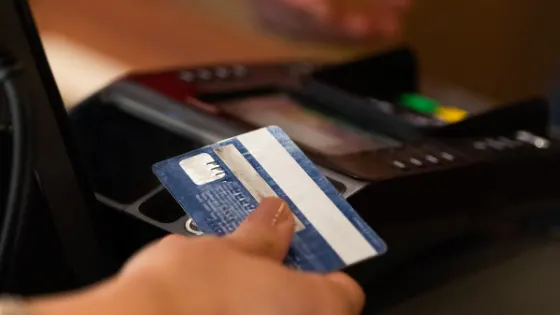If your credit score is lower than you’d like, you may be able to fix it. But first, you must know if the errors are your fault or someone else’s. If they aren’t your fault, credit repair services may help. You could do it yourself, but sometimes professional help is worth it, especially if the issues are complex.
Table of Contents
Why You Should Want to Repair Your Credit Score
Everyone should want to repair their credit score. A good credit score gets you much further than an average or poor score.
First, you’ll have a higher chance of loan approval when you have a good credit score. Even if you can get approved with a low score, better credit scores secure lower interest rates and fees. They also get you lower insurance premiums and may help you land your dream job.
Your credit score follows you everywhere – even places you wouldn’t think, like car or home insurance. Even some cellphone companies and utility companies check your score.
Knowing how to repair credit and then do it is essential to save you money in the long run.
How Long Does It Take to Rebuild Your Credit?
There’s no specific timeline that it takes to rebuild your credit. Every situation is different. Quick fixes, like bringing late payments current take a matter of a month or two. Once you get current on your debts, you’ll see your credit score increase.
More complex issues, like foreclosures, bankruptcies, or overextended credit lines may take longer. If it’s not an ‘easy’ fix it could take 6 to 12 months before you see any real changes.
The key is consistency. Once you get caught up your late payments, for example, you must stay current. Falling behind again only makes your credit score fall. The same is true of other issues – even if you can’t fix the issue right away, small consistent changes make a big difference.
Your credit score changes monthly and is always a work in progress.
No matter which way you look at it, fixing your credit is a lot of work. You have to know what to look for, what to fix, and how to fix your credit.
If it’s too much, you may consider paying someone to fix your credit score.
Pay to Fix Your Credit Score
There is such a thing as paid credit repair. It’s a service you pay for (usually monthly), but it may help you fix your credit and/or learn how to build credit. It sounds crazy and almost illegal to pay someone to fix your credit score, but it’s legit and may help.
Allow Credit Saints to work with all three credit bureaus to remove negative, inaccurate items from your credit history. When they are done, they will analyze and optimize your report to secure a bright financial future.
- 90-Day Money Back Guarantee
- A+ BBB Rating
- Excellent Service With 24/7 Availability
- Open 7-Days a Week
- Same Team From Start to Finish
- 3 Monthly Subscription Packages
- Initial Work Fee
- Monthly Subscriptions Fees
- Not Available in 9 States - Georgia, Kansas, Louisiana, Ohio, Oregon, Minnesota, Mississippi, Missouri, and South Carolina
Is It Legal to Pay Someone to Fix Your Credit Score?
Yes, it is legal to pay someone to fix your credit score.
Here’s why.
They aren’t ‘fixing’ it. They are operating within the law. Credit repair companies dispute any incorrect or unfair information on your credit report. They are professionals who understand what creditors and credit bureaus can and cannot do.
Essentially, they make sure your credit report shows accurate and fair information. If there are any errors, the Fair Credit Reporting Act gives you the right to dispute the errors. You can do it yourself or pay a credit repair company to do it for you.
How Much Does Credit Repair Cost?
If you do credit repair yourself, it costs nothing but your time and it takes a lot of it. It may also cost you positive results.
It’s easy to get overwhelmed by creditors and credit bureaus. They use big words and prey on the fact that most consumers don’t know the law. Even though you can fix your credit for ‘free’ you may not get the errors fixed.
If you hire a credit repair agency, the cost depends on who you use and what services you want. On average, you’ll pay $19.99 per month to $149 per month.
For example, if you were a victim of identity theft and didn’t know for many months, you may need extensive services to undo the damages caused and will pay for the higher cost packages.
But, if you just have a few collections or issues on your credit report that aren’t a result of identity theft, you may get by with basic credit repair services.
What Do Credit Repair Companies Do?
Again, credit repair companies don’t wave a magic wand and fix your credit score. They use legit methods to help improve your score.
They’ll pull your credit report and go over it, looking for errors. Together you and the professional determine which tradelines aren’t accurate or have errors and then they get to work.
A credit repair company will dispute the debt. They’ll ask for a lot of information from the creditor. If the creditor can’t provide the proof you ask for, the credit bureaus must delete the information from the credit report.
Credit repair professionals know exactly what to ask for (which is why you pay them). They’ll ask for specific dates, account numbers, account balance amounts, and original balance amounts. They’ll ask for proof of how they received your account (if it’s a collection agency) and for proof that they have the legal right to do business in your state.
If the credit bureau can’t provide the information you asked for, they must remove it from your report.
It sounds simple, and maybe like something you could do yourself, but if your credit needs a lot of work, it’s often well worth it, especially when you find the right company.
What Are the Best Companies to Help Me Fix My Credit?
If you decide fixing your credit isn’t something you’re willing or capable of doing yourself, here are the best companies to help you fix your credit.
Lexington Law
Lexington Law has been in business since 2004, and has removed as many as 56 million incorrect or inaccurate credit lines from credit reports so far.
Owned and run by lawyers, you get a level of professionalism and knowledge at Lexington Law that you don’t get elsewhere. Lexington Law has three programs ranging rom $89.95 – $129.95 per month. The difference in the packages has to do with the complexity of services.
Get a free credit consultation from Lexington Law. Afterwards you will receive a free credit report summary, and free credit repair recommendations!
- Law Firm Dedicated to Credit Repair
- Great Track Record and Rating
- High-Quality Analysis of Credit
- Available Credit Counseling
- A Variety of Educational Tools
- Multiple Subscription Plans
- No Accredited by the BBB
Credit Saint
Credit Saint is one of the top-rated credit repair companies. They offer a free consultation to help you see where they can dispute credit information for you. Once you formulate a plan, Credit Saint professionals get to work, disputing your credit.
Like most credit repair companies, they offer several options. They all include credit challenges for all three credit bureaus. The larger packages include a larger number of disputes per cycle. They start at 5 per cycle and go up to 10.
What sets Credit Saint apart from the others is the 90-day money back guarantee they offer. The guarantee covers you if Credit Saint isn’t able to remove any issues from your credit report in 90 days, you’ll get your money back.
Allow Credit Saints to work with all three credit bureaus to remove negative, inaccurate items from your credit history. When they are done, they will analyze and optimize your report to secure a bright financial future.
- 90-Day Money Back Guarantee
- A+ BBB Rating
- Excellent Service With 24/7 Availability
- Open 7-Days a Week
- Same Team From Start to Finish
- 3 Monthly Subscription Packages
- Initial Work Fee
- Monthly Subscriptions Fees
- Not Available in 9 States - Georgia, Kansas, Louisiana, Ohio, Oregon, Minnesota, Mississippi, Missouri, and South Carolina
SkyBlue Credit Repair
SkyBlue Credit Repair has one low-cost monthly package and also offers a 90-day money back guarantee. Every SkyBlue customer gets the same services, there aren’t confusing packages or expensive upgrades.
SkyBlue will dispute 5 credit issues per bureau (total of 15) per month. They offer custom disputes (no cookie cutter letters) and provide guidance to rebuild your credit. Their package also includes Cease and Desist letters and Goodwill Letters, which most companies make an extra charge.

How to Fix Bad Credit Yourself
You don’t have to pay someone to fix your bad credit. You can try to fix it yourself too. Before you do, understand the work involved.
Here are the steps to fix bad credit yourself.
Get Copies of Your Credit Reports
Pull all three credit bureau reports. Everyone gets free annual access to all three reports. If you’ve already exhausted your free option, there are paid options too. Remember, you want the full credit report, not just your credit score.
You need the credit history to analyze your credit report.
How to Read & Analyze Your Credit Report
Credit reports are overwhelming, but don’t be alarmed.
Break it down into bite size pieces. Check the top of the report to make sure your personal information is correct. It will include your current address as well as past addresses.
Next, look at your tradelines. This is where disputes begin.
Look at the following information:
- Creditor name – Did you have an account with said creditor?
- Account number – Do the account numbers match your paperwork?
- Balance – Look at the original balance and current balance and note any errors
- Payment history – Are all payments reported right? If there are late payments you didn’t make late, make note.
- Outstanding balance – Is the current outstanding balance correct?
Jot down any errors you notice; we’ll use them in the steps below.
Do I Need to Check All Three Credit Reports?
Always check all three credit reports. It’s triple the work, but worth it.
Some creditors report to all three bureaus and some report only to one or two. For example, your credit card company may only report to Equifax. If you only check TransUnion or Experian, and your credit card company reported something in error, you wouldn’t know.
Take the extra time to pull all three reports and comb through them carefully.
Analyze Your Credit Reports for Errors
Using your notes from the step above, determine the nature of the errors. Ask yourself:
- Is it a typo, such as a misspelled name or mistyped account number?
- Is it a larger issue, such as a payment history error?
- Are your current balances incorrect?
- Do some of the accounts reporting not belong to you and/or did you not open them?
- Are there public records that don’t involve you or have errors?
Using the information above, you’ll dispute the credit report errors with the right bureau.
How to Dispute Credit Report Errors
Separate your credit report errors by bureau and then by tradeline. Only dispute one account at a time. If an account has multiple issues, like the wrong account number and wrong balance, use one dispute, but keep all separate accounts separate.
All three credit bureaus offer an online credit dispute process. Experian, TransUnion, and Equifax walk you through the process step-by-step online. You can also send the dispute via snail mail or phone, but we recommend doing everything in writing.
Include as much detail as possible about the error and include proof of the mistake if you have anything, such as a statement or correspondence from the creditor. The more details you provide, the more likely it is that you’ll win.
Credit Bureau Dispute Alternatives
If disputing each account with the credit bureaus seems too tedious or you don’t have the necessary documentation, consider a 609 Letter.
The 609 Letter is a cross between a dispute and debt validation. It uses Section 609 from the Fair Credit Reporting Act which states that you have the right to request further information about your credit report.
In short, you are asking the creditor to prove the account they report on your credit report belongs to you. You can buy a template or write it yourself. Essentially, you ask for the original sources of information about the accounts you listed in the letter including the original contract with your signature to validate that the debt belongs to you.
At the end of the letter, state if they can’t provide what you ask, they must remove the debt from your credit report as it’s not validated.
Related Article: Should I Refinance Student Loan Debt?
How to Decide What Needs to Be Fixed or Repaired
Before you dispute credit errors, decide if they’re truly errors or if they are mistakes you need to repair. For example, if you let a credit card get charged off and all information reported about it is correct, you can’t dispute it, but you can fix it.
Fixing it means working with the creditor on a payment arrangement to pay off the debt AND remove it from your credit report. You may want to ask for a Pay for Delete, which means you agree to pay a certain amount (it could be a negotiated amount) in exchange for the creditor deleting the account from your credit report so the negative information doesn’t exist.
How to Handle Past Due Accounts on Your Credit Score
Your payment history makes up the largest portion of your credit score. It’s 35 percent of your credit score. Pay close attention to any late payments and bring them current fast. If you can’t, contact your creditor and ask what options they offer.
Some creditors have deferment plans or payment arrangements so you don’t damage your credit score further with late payments.
What Is Credit Utilization?
Credit utilization is the amount of outstanding credit versus your total credit line. The magic number is 30 percent. If you have more than 30 percent of your credit line outstanding, it could hurt your credit score.
How Do High Balance Accounts Impact Your Credit Score?
Credit utilization makes up 30 percent of your credit score and is the second largest factor. If your utilization exceeds 30 percent of your credit lines, do one of the following:
- Pay your balance down fast
- Consolidate your debt into one loan
- Apply for a 0% APR balance transfer credit card and transfer over your credit card debt

How to Safely Improve Your Credit Score
It’s easy to want to try everything at once to improve your credit score, but take one step at a time. If you’ve exhausted all options to dispute errors or validate the debt, focus on your payment history. Bring any late payments current and keep making your payments on time.
This is the largest part of your credit score, so is most important. Next, focus on your credit utilization.
When You Should Increase Your Credit Limits
If you have a decent credit history with on-time payments, but have high credit utilization rates, consider asking for higher credit limits. This immediately lowers your credit utilization rate.
BUT, don’t do this if you’ll rack up more debt. If you are too tempted by large and available credit lines, work out other options with your creditor or consolidate the debt into one loan.
Pay off High-Interest, Newer Accounts First
Order your debts by interest rate (highest to lowest) and newest to oldest. You want to pay off the high interest debt, but get rid of the newest debt first too, as that hurts your credit score more than old debt.
How Long Does It Take to Build Credit?
If you’re starting from nothing, it takes three to six months to build credit. It may take longer if you’re trying to REBUILD credit from a low credit score. The key is to figure out where the issues occurred that brought your score down so much and focus there first.
Building credit in either situation requires consistency and small steps. You won’t build credit overnight, just like you didn’t ruin your credit overnight. Stay consistent like you would with a diet and in time, you’ll see your efforts pay off.
Repair Your Credit starting today! Dispute negative or inaccurate items quickly and affordably on your report. Plans start at $99/month.
- 90-Day Money Back Guarantee
- You Don't Get Charged Until Letters Are Mailed
- $0 Enrollment Fee
- Free Consultation
- Open Enrollment to all 50 States
- 24/7 Access to Portal Online
- Home and Auto Loan Approval Guaranteed
- 10-Day Result Goal
- Cancel When You Want
- Not BBB Accredited
- Monthly Cost
How to Maintain Healthy Credit Accounts
Once you build credit, you must maintain it. All your hard work will be for nothing if you don’t keep it up. Here are our top tips:
- Make all payments on time even if you only make the minimum payments. If you miss a due date, don’t let it get more than 30 days late so your credit score isn’t affected.
- Keep your credit balances at less than 30 percent of your total credit line. If you get close, pay the balance down, transfer the debt, or ask your creditor to increase your credit line.
- Only apply for new credit when you need it. The ‘older’ your credit is, the more your score will increase.
- Dispute any errors or fraudulent activity on your credit report right away.
How to Keep Track of Your Credit Score Long Term
Always pull your three credit reports from www.annualcreditreport.com annually. Once you fix your credit, pull one report every four months so you cover the entire year.
Your bank or credit card companies likely provide access to your credit score too. It’s usually a service you must opt into, but it’s free. You’ll get access to your credit score monthly. It’s not exactly the credit score lenders see, but you’ll know the way your credit score is trending and can adjust.
The Age of Your Accounts Matter
The older your credit accounts are, the better your credit score will be. To keep them ‘old’ open new accounts sparingly and don’t close old accounts unless necessary. For example, if you paid off your credit card, don’t close it. Instead, lock it up somewhere safe, but keep the line open. You’ll get credit for the ‘older credit’ but won’t be tempted to rack up debt again.
When You Should Open New Lines of Credit
Try to only open new credit when you absolutely need it. Your credit age is an average of all accounts so every time you open a new account, you lower your credit age, and your credit score.
The Importance of Paying Your Bills on Time
We can’t stress this enough. ALWAYS pay your bills on time. If you can’t, talk to your creditor. Don’t ignore the late payments and assume it will be okay. It won’t. Late payments hurt your credit score the most.
Credit Repair Tips and Considerations (Conclusion)
If you need credit repair services to fix your credit, take advantage of the services available. If you can fix it yourself, go for it. Just make sure you’re aware of all your options and know how to check for even the smallest error that you could dispute, forcing the credit bureaus to remove the debt from your credit report.
Check out our post on The 11 Best Credit Repair Companies to get some outside help improving your credit score!
Samantha Hawrylack is a personal finance expert and full-time entrepreneur with a passion for writing and SEO. She holds a Bachelor’s in Finance and Master’s in Business Administration and previously worked for Vanguard, where she held Series 7 and 63 licenses. Her work has been featured in publications like Grow, MSN, CNBC, Ladders, Rocket Mortgage, Quicken Loans, Clever Girl Finance, Credit Donkey, Crediful, Investing Answers, Well Kept Wallet, AllCards, Mama and Money, and Concreit, among others. She writes in personal finance, real estate, credit, entrepreneurship, credit card, student loan, mortgage, personal loan, insurance, debt management, business, productivity, and career niches.





